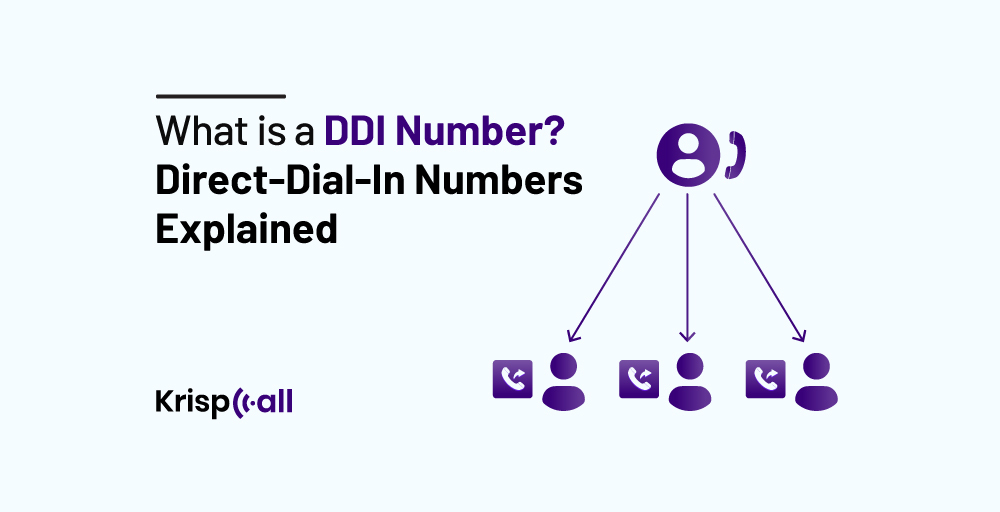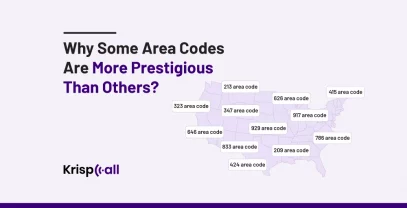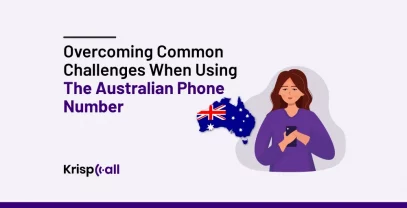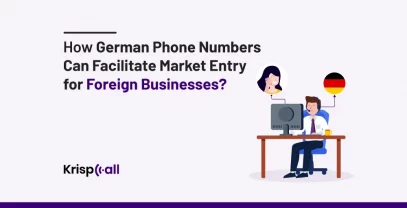Looking to step up the convenience and efficiency of your business’s telecommunication system?
Or maybe you just don’t like going through a long list of human receptionists who are not always available?
If yes, then there’s a solution, a piece of telephony tech you can make use of. It’s called a direct dial-in number! 💡
With a direct dial-in number, you can facilitate a better flow of your business telephone communications and take advantage of many more benefits.
In this article, you will learn everything related to DDI numbers, including how they work, how they compare to toll-free and local numbers, their benefits & drawbacks, and which providers offer the best Direct Dial-in numbers.
🔑 KEY HIGHLIGHTS
- DDI numbers let you directly call a specific extension by yourself.
- DDI (Direct-Dial-In) and DID (Direct Inward Dialing) numbers are the same.
- You can obtain DDI numbers from VoIP phone service providers.
- The DDI number providers are KrispCall, United World Telecom, Mightycall, Nextiva, and Ooma.
So, are you ready to get started? 👇
What is a DDI number?
DDI, an acronym for Direct Dial-In, also known as Direct Inward Dialing, is a cloud telephony service that allows callers to reach specific extensions to a specific department within a business directly without having to go through a receptionist, an automated menu system, or an IVR.
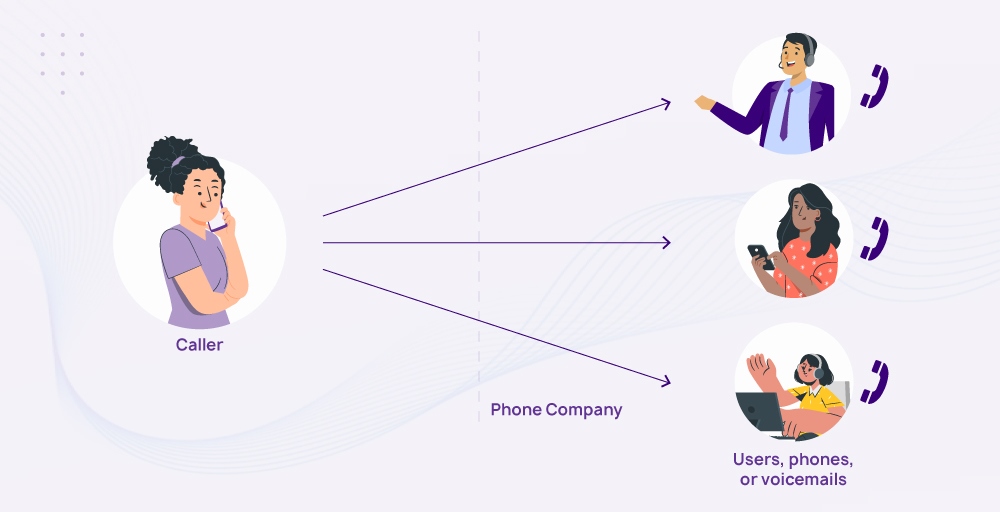
To put it simply, DDI numbers are like personalized virtual numbers that look just like any other number and allow the callers to get in touch with a specific team and go directly to that location or an extension of a company. DDI numbers come in a variety of forms and serve different purposes as per their configuration.
What are Direct-Dial-In numbers used for?
DDI/DID numbers can be used in a variety of ways, depending on the role they need to carry out. Here are some examples of how Direct-Dial-In numbers are used:
- Provide Individual Access: The most typical use of DID numbers is to empower the callers to bypass the main switchboard and connect directly to the person or team they need.
- Provide Personalized Service: DID numbers are also used to offer personalized service to important clients by establishing direct contact with a particular person or department within a business.
- Efficient Communication: Most organizations employ DDI numbers to streamline the telecommunication process and minimize the time spent by the callers navigating through a phone system.
- Improve Productivity: These numbers also help employees spend less time answering and transferring calls to the intended person/team to achieve higher productivity.
What is the difference between a DDI number and a DID Number?
When referring to DDI and DID numbers, there’s actually no difference between the two; these are just two different names for the same tech and are often used synonymously. The only difference is that the term ‘DID’ is primarily used in Europe and Oceania, and ‘DDI’ is more widely used in the USA and other countries outside of Europe.
How do DDI numbers work?
We know the workings of a typical business phone system, where you make a call requesting help to the business’s phone number, the receptionist picks up the call, and then manually redirects it to the concerned department.
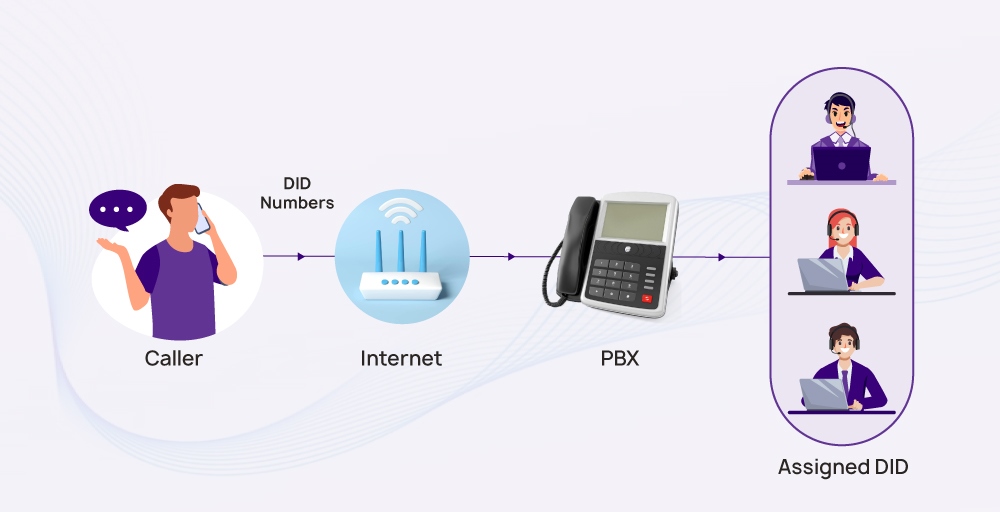
DDI numbers eliminate all this hassle and work directly by connecting to the person or team you want to contact. And to make use of it, a business needs first to purchase a range of DDI numbers from a provider and assign each to a specific extension or phone line that leads to an appropriate department.
To give a better understanding of the system’s working, here’s a breakdown:
Step 1: A caller makes a call to a DDI number of a business.
Step 2: The call is then routed via the Internet to the correct phone number of the business.
Step 3: After that, it is connected to the business’s phone system.
Step 4: Now, the PBX identifies the DDI number.
Step 5: Then, the PBX automatically re-directs the call to the appropriate person/team/department.
Step 6: Finally, the extension phone rings and the concerned personnel can answer the call.
Now that you’ve learned how DDI numbers work, it’s time to learn where to obtain one. Well, the next topic is solely about that.
How to get a Direct Dial In (DDI) number?
When considering acquiring a Direct Dial-In number, there’s no answer other than obtaining one through a cloud-based phone service provider. To make the process even simpler for you, here’s a step-by-step description of how to do so:
- The first step is to choose a VoIP provider, such as KrispCall, that offers DDI numbers.
- You will now have to create an account on the website of the provider you have selected. As part of this process, you may have to provide information about your business as well as your contact information.
- Once you have an account, in the next stage, log in to the provider’s dashboard or portal to select a DDI number of your choice.
- In the next step, you can begin configuring your phone system in accordance with your needs.
- Finally, test your cloud-based phone system’s DDI number by making a test call.
7 Benefits of DDI/DID Numbers For Your Business
If you are a business owner, implementing a DID number can bring loads of benefits that can significantly boost your business’s telecommunication. While there are a huge number of advantages, here will discuss seven most significant ones:
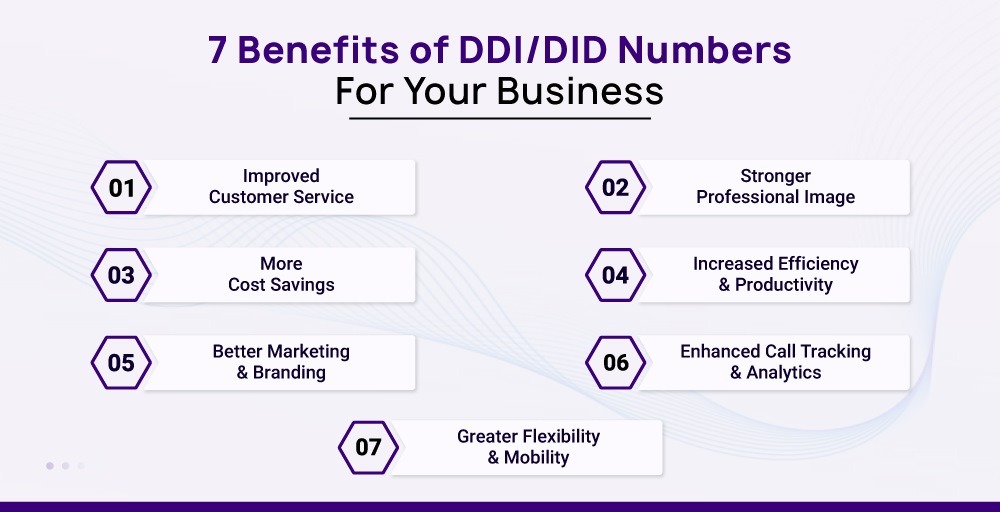
- Improved Customer Service: As DID numbers simply eliminate the need for call queues and waiting time and enable customers to directly connect with the relevant person/team, their existence itself results in improved customer service.
- Stronger Professional Image: With DDI numbers, each department can get its own dedicated phone number, and thus, clients can easily reach the specific person they need, enhancing the overall professionalism of an organization.
- More Cost Savings: It might sound ironic, but these numbers can help businesses save money by enabling faster communication between employees, customers, and team members.
- Increased Efficiency & Productivity: DDI/DID numbers help improve efficiency as well as the productivity of the employees as all calls go directly to the intended recipient, eliminating the need for manual transfer or going through an operator.
- Better Marketing & Branding: You can obtain special DID numbers in the form of vanity numbers for targeted marketing campaigns. Use those to gauge the effectiveness of your campaigns, all while strengthening your brand recognition.
- Enhanced Call Tracking and Analytics: With DID numbers, each department can obtain segregated analytics & track all the calls, and use them to make informed decisions regarding resource allocation and customer service improvements.
- Greater Flexibility and Mobility: When taking remote work into consideration, these can particularly be beneficial, as with DDI numbers, employees can continue to be productive and receive important customer calls via dedicated lines.
What are the drawbacks of DDI numbers?
You now know all the advantages of having DDI numbers for your business, but now it’s time to learn its drawbacks. And just like all man-made things, DDI numbers come along with a good number of those.
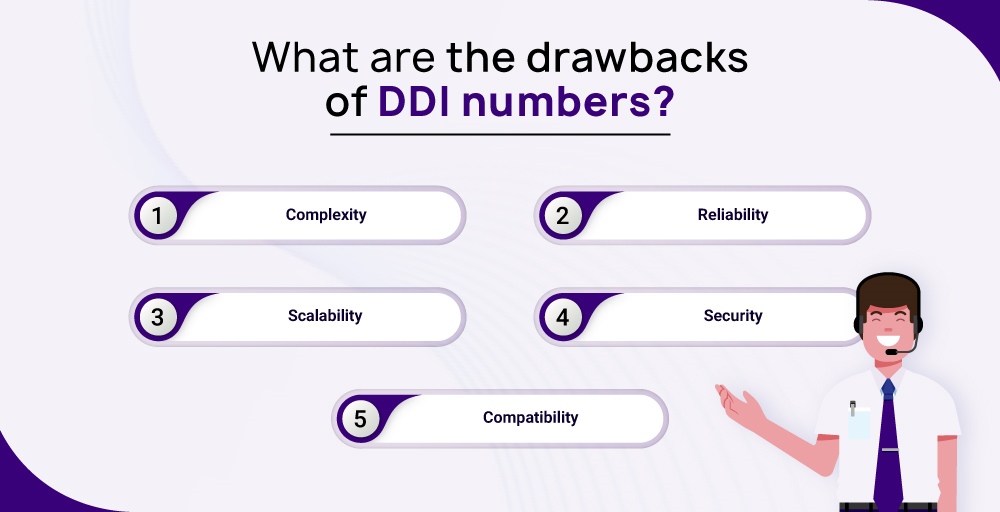
Here are some of the most commonly encountered ones:
- Complexity: Setting up and implementing Direct Inward Dialing numbers can be more complex than traditional phone lines and may require technical expertise or support.
- Reliability: DDI numbers are VoIP based and hence completely rely on the Internet for their working. Thus, you may face interruptions in case of internet issues or power outages.
- Scalability: Though these numbers offer some form of scalability, they are not the best solutions for rapidly growing businesses that often make changes to their telephony systems.
- Security: DID/DDI numbers can be vulnerable to spam and security breaches if not properly configured, as they expose internal phone systems to the public.
- Compatibility: You have to have an up-to-date telephony system to use these numbers. Also, DDI numbers are not compatible with all existing phone systems or networks.
DDI Numbers vs Toll-Free Numbers. What are the differences?
While DID and Toll-free numbers are both types of phone numbers that are used by businesses, they have some key differences. Here are some of their major differences:
| Highlight | DDI Numbers (Direct Dial-In) | Toll-Free Numbers |
|---|---|---|
| Cost | Budget-friendly. Generally cheaper to acquire and maintain. | Premium price. More expensive due to covering caller costs. |
| Caller Charges | Regular call charges apply based on their phone plan. | The Caller pays absolutely nothing for the call. |
| Geographic Reach | Local focus. Ideal for businesses serving specific regions or communities. | Wider reach. Perfect for national or international operations. |
| Brand Perception | Familiarity and familiar feel. Customers connect with a local presence. | Professional and established image. Creates a sense of trust and reliability. |
| Call Tracking | Basic call tracking is available. It may involve additional costs for advanced features. | Advanced call tracking and analytics are often built-in. Gain valuable insights into caller behavior. |
| Best for | Businesses with a strong local presence. | Businesses aiming for national/international reach. |
Are local numbers and DDI numbers the same?
If we tend to simplify our understanding, then Yes! Local numbers and DDI numbers are essentially the same thing.
They both refer to phone numbers that have direct inward dialing (DID) capabilities, meaning callers can reach a specific extension or phone line within a company or organization without going through a central telephone system or an operator.
5 Best VoIP DDI Number Providers of 2024
1.KrispCall
With a dedication to value, quality, and ease of use, KrispCall is one of the most reliable providers of DDI numbers in the virtual telephony industry. Trusted by over 4500+ global companies in 100+ countries, KrispCall’s cloud-based VoIP service offers advanced features like shared phone numbers, DND modes for agents, global calling, call forwarding, and many more.
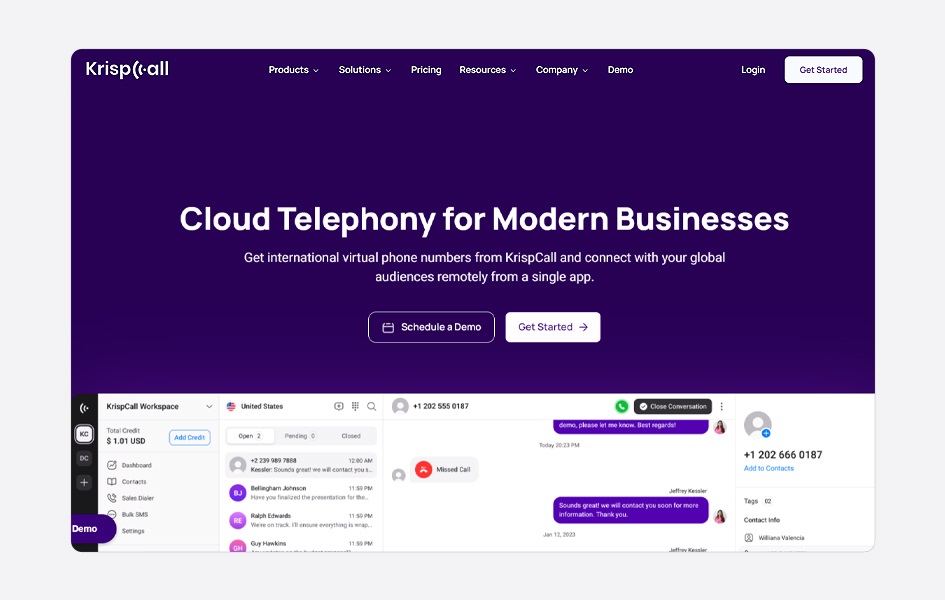
KrispCall’s user-friendly interface ensures a seamless experience backed by exceptional customer support. KrispCall is the go-to choice for those seeking efficient and cost-effective DID, toll-free, mobile, and landline virtual numbers that can meet their needs of every kind.
KrispCall’s Features
- Unified Callbox
- Global Calling
- Voicemail to Email
- Shared Phone Number
- Call & Contact Tagging
- Call Forwarding
- Call Transfer
✅ Pros
- Global Reach
- User-friendly Interface
- 24/7 Human support
❎ Cons
- Apps for Windows and Mac OS are not yet available.
- Connectivity to the Internet is required
2. United World Telecom
With over 20 years of experience in the telephony market,United World Telecom is also considered one of the top DDI number providers. It is a cloud-based VoIP provider that offers virtual phone numbers to its clients in 160 countries.
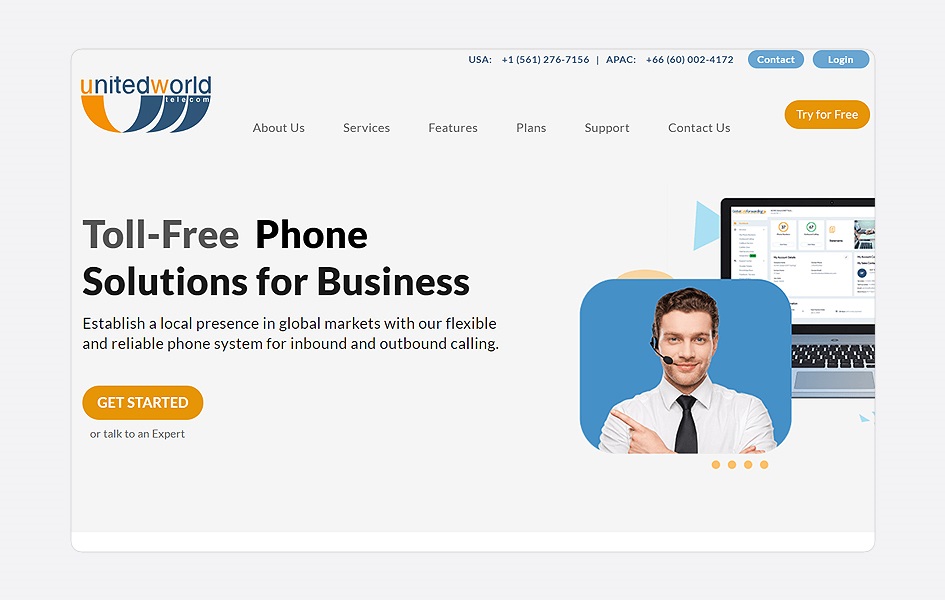
United World Telecom’s features have been helping businesses connect to their customers effortlessly and giving them a platform to create a local presence in the global market.
Features
- Advanced IVR
- Time-of-day routing
- Sequential forwarding
- Voicemail-to-Email
- Failover Routing
Pros
- Post-onboarding support service is provided
- Online account management
- Easily navigable dashboard
Cons
- Incoming calls aren’t always notified
- SMS templates aren’t available
3. MightyCall
If you are a small business owner and looking for DDI numbers, then MightyCall should be at the top of your list. It offers a cloud-based communication platform that is designed and well-suited for the use of small businesses and entrepreneurs.
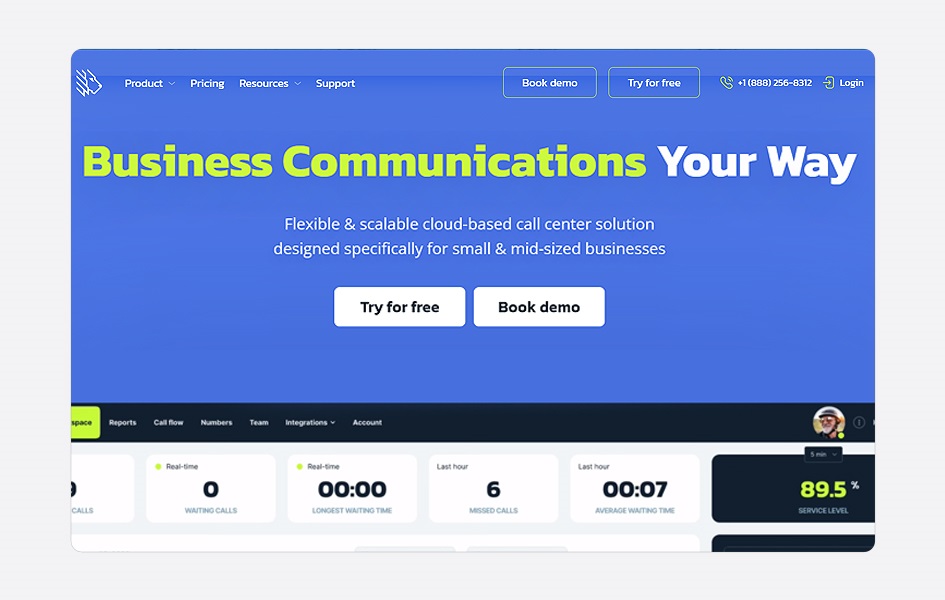
MightyCall’s solutions include a wide range of features and are easy to use, reliable, and affordable. It is a great option for businesses looking to improve their communication and collaboration.
Features
- Automatic Call Distribution
- Multi-level IVR
- Call Barging
- Agent Workspace
- Conference Calls
Pros
- Daily customer support line
- Mobile app for Android and iOS
- Provides good value for money
Cons
- The interface is not user-friendly
- Limited customization options
4. Nextiva
Nextiva provides businesses worldwide with a complete VoIP system that has DID phone numbers. Individuals and businesses in search of a comprehensive solution can turn to it as a go-to system, as it has the features and capabilities of a complete cloud telephony service.
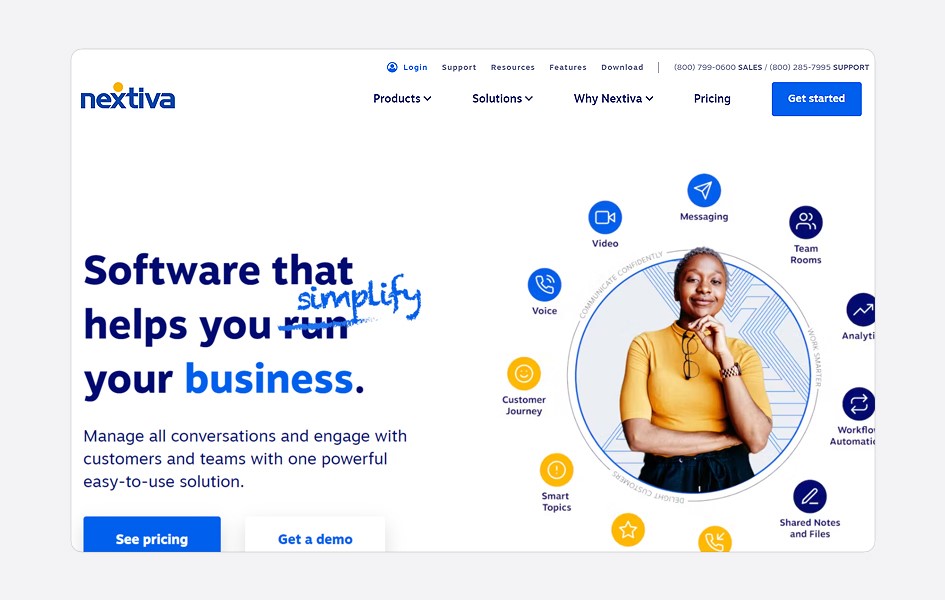
Nextiva’s scalable platform, easy-to-use and affordable services, and plans for businesses of all sizes make it an ideal choice for companies from all industries.
Features
- Admin Management
- Business Text Messaging
- Voicemail Transcription
- Video Conferencing
- Call Analytics
Pros
- Easy to use and understand
- Great customer service
- Unlimited domestic calling (US and Canada)
Cons
- Not very scalable
- Few management tools
5. Ooma
If you’re a business owner, Ooma is also an excellent option for you. Along with its DDI phone numbers, it also offers businesses a broad range of innovative features, such as audio conferencing, call recording, video conferencing, and unlimited calling.

Further, Ooma’s user-friendly interface is easy to use and can benefit businesses, especially in terms of improving their workflow and marketing campaigns.
Features
- Enhanced Call Blocking
- Shared Voicemail Boxes
- Virtual Receptionist Scheduling
- Video Conferencing
- Ring Groups
Pros
- Easy to set up and use
- Live chat support
- Feature-rich and user-friendly
Cons
- Limited integrations
- Hidden setup fee
Wrapping Up
To wind up everything, Direct Dial In or Direct Inward Dialing is a technology that lets you connect with a particular individual/team/department without the need to utilize an intermediary.
With DDI numbers, you can improve your business’s internal telecommunication and enhance your customers’ calling experience, and as the business landscape continues to grow, the significance of DDI numbers will be as well.
When considering obtaining a DDI number, there’s no better option than KrispCall. With KrispCall, you can obtain virtual numbers in more than 100 countries that are accompanied by a complete set of features like shared numbers, member-to-member communication, and call & contact tagging.
These KrispCall’s features can take your call center telecommunications a bit further and make your business look more professional, while at the same time allowing you to harness the full potential of DDI numbers to boost cloud-telephony strategies.
So, why wait? Book a free KrispCall’s demo now!
FAQs
What does DDI stand for?
DDI stands for “Direct-Dial-In” or “Direct-Inward-Dialling.” It is a virtual telephone number that allows callers to reach a specific extension without speaking to a switchboard or using an automated menu system.
What is DDI in a call center?
In a call center, DDI, which stands for Direct Dial Inward, is a service that provides individual phone numbers for each agent or department. These numbers are used to bypass the main call queue and then connect callers directly to the intended recipient. This works similarly to an extension in a traditional office setting.
What is the cost of a DDI number?
A DDI number can cost you as little as $1 per month or as high as $5 per month in the USA. However, the exact numbers may vary as the cost is heavily influenced by factors like the number provider, your geographical location, and the phone number type you want.
Does your business need a DDI number?
As DDI numbers allow callers to bypass the main reception line and directly reach a specific extension or location within a business, your business definitely needs it. However, its actual usage may vary depending on your specific needs and goals. Here are some reasons why your business might consider using DDI numbers:
- With DDI numbers, customers can reach a staff member without hurdles when they need them, which can be a memorable experience for them.
- DDI numbers help companies to reduce the number of physical telephone lines and forward calls across offices within their company group, often saving long-distance fees.
- The team can communicate directly with each other via a dedicated extension even if they live in geographical regions.
How can I get a free DDI number?
Typically, You can obtain a free DDI (Direct-Dial-In) number from certain providers. For example, some companies offer DDI numbers for free as part of their service.

